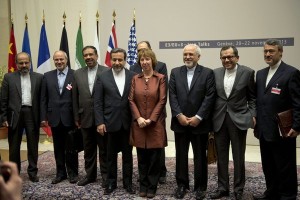By Erisa Nuku
Staff Writer

On November 24th Iran and the P5+1 delegates, led by the EU’s foreign policy chief Catherine Ashton, signed a historic agreement that will curb Iran’s nuclear enrichment program for an interim period of six months. The deal was made in the third round of the Geneva negotiations following lengthy, confidential talks. As part of this agreement, Iran has agreed to not enrich uranium above 5%. Halting uranium enrichment represents a crucial aspect of the deal, as enriching up to 90 % leads to the creation of nuclear weapons. Iran has also approved the inspection of its uranium enrichment reactors by the UN’s expert body, the International Atomic Energy Agency, and has agreed to freeze its enrichment capacity by not activating any new centrifuges. As a result of the deal, construction at the Arak reactor will have to be slowed down. In return for cooperation, the West will ease the sanctions that crippled the Iranian economy by giving Iran 6 to 7 billion dollars of relief. Some of its assets abroad will also be unfrozen. The six-month period will be used to further negotiate a more comprehensive deal.
President Obama welcomed the deal, stating, “For the first time in nearly a decade, we have halted the progress of the Iranian nuclear program, and key parts of the program will be rolled back.” The agreement was received much differently by the Israeli Prime Minister Benjamin Netanyahu, who called the agreement a “historic mistake”, which threatens the existence of Israel.
Saudi Arabia, a Sunni dominated state and Iran’s historic rival, welcomed it with cautious optimism, by stating that it could serve as a first step towards a lasting solution. During his tour in the Gulf States, Iran’s Foreign Minister Javad Zarif explained that the nuclear deal does not pose a threat to any country and called for the intensification of relations with Saudi Arabia.
While it is too early to foresee any results, this deal could have important implications for the region. According to OPEC, Iran possesses 13% of the world’s oil reserves. This means that oil prices could eventually decrease because Iran would have fewer obstacles to selling it on the global market. The possibility of peace in Syria could also be renewed, as Iran persistently backed Al-Assad’s regime but could now help mediate a peaceful political solution in Syria. Furthermore, because the nuclear technology gives Iran an advantage over other countries in the region, the problem of the balance of power could lead to a regional arms race. Countries that are skeptical about Iran, such as Saudi Arabia, could also attempt to develop nuclear weapons in order to maintain their strong position in the region. Lastly, another problem that could arise in the upcoming negotiations is the formal recognition of Iran’s right to enrich uranium under the Nuclear Non-Proliferation Treaty. Iran believes that nuclear rights fall under international law, which the United States does not agree with.
November’s breakthrough deal was interpreted differently by the parties, with Zarif stating that this agreement does acknowledge the right to enrichment. Despite the fact that the deal is temporary and could possibly fall apart, thus making future negotiations even more difficult, all parties should be applauded for their willingness to work towards a diplomatic solution. If a permanent agreement is to be reached in the course of the upcoming months, it could put an end to Iran’s nuclear crisis, one of the most controversial issues of the past decade.
Erisa Nuku, class of 2015, is a Law and Politics major from Tirana, Albania.
